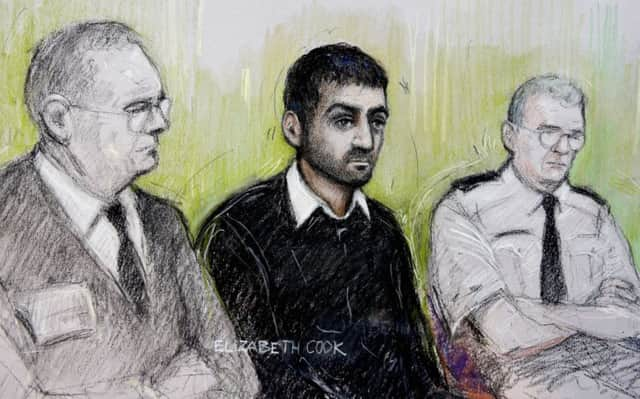Bomb manual pair jailed after trial in secret


Erol Incedal, 27, broke down in tears last week as he was found not guilty after a retrial of plotting with a terrorist in Syria to either target individuals such as former prime minister Tony Blair or carry out a “Mumbai-style” outrage using a Kalashnikov.
Last year, Incedal, from south- east London, was convicted of possessing a bomb-making manual on a memory card at the time he was arrested in October 2013. His friend, London-born Mounir Rarmoul-Bouhadjar, also 27, admitted having an identical document.
Advertisement
Hide AdAdvertisement
Hide AdTurkish-born Incedal has been in custody since he was stopped by police. Yesterday, at the Old Bailey, he was jailed for 42 months and Rarmoul-Bouhadjar was sentenced to three years.
Trial judge Mr Justice Nicol said there were viable instructions for home-made bombs on the memory card.
He said: “The potential for such bombs to cause death, injury and destruction is obvious. The fear, panic and terror which explosions also bring are often a deliberate part of the terrorist’s ambition.”
As Incedal had admitted in his trial to discussing a plan to trade class A drugs and to acquire a gun with his friend, their mitigation of previous good character was “somewhat blunted”, the judge said.
Advertisement
Hide AdAdvertisement
Hide AdBoth defendants have been in custody since their arrest 17 months ago, so they could be eligible for parole within months.
Outlining the case against them, prosecutor Richard Whittam QC told the court how the pair travelled to the Turkey-Syria border in early 2013 in support of opposition to the Syrian regime.
He said they crossed the border into Syria and had stayed in a house or compound on the border where they mixed with other Islamists and were shown how to strip and reassemble Kalashnikov rifles and how to make improvised explosive devices.
Rarmoul-Bouhadjar viewed documents about IEDs on a computer and Incedal knew about it, he said.
Advertisement
Hide AdAdvertisement
Hide AdDuring the trial, Incedal said they returned to London because the conditions were “harsh” and Rarmoul-Bouhadjar wanted to go back to his job.
Incedal accepted that photographs of them dressed as if they were doing humanitarian work were “a sham”, Mr Whittam said.
When they were stopped and arrested as they travelled in a Mercedes-Benz car on October 13, 2013 near Tower Bridge, police found files on micro SD cards inside the covers of their mobile phones which included the bomb-making document.
It was found to contain instructions to make “viable” explosive devices, Mr Whittam said.
Advertisement
Hide AdAdvertisement
Hide AdPolice found notes on routes of travel from London to Pakistan and the Yemen when they searched Incedal’s home, as well as a nine-point list for travel including “cover stories” and a timescale coinciding with Ramadan.